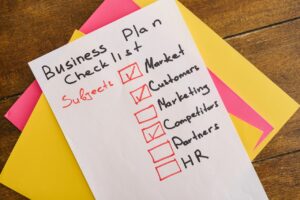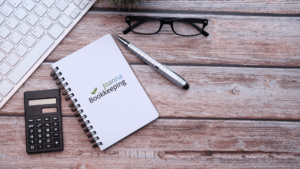6 Things You Thought About VAT That Are False

Value Added Tax (VAT) can seem like a daunting topic to deal with. It’s complicated, it’s confusing, and there are seemingly endless rules. But fear not! We’re here to help you navigate the murky waters of VAT compliance. In this article, we’ll look at six common misconceptions that people have about VAT and explain how they’re actually wrong.
At Joanna Bookkeeping we help support business owners by explaining exactly what VAT is, and how it impacts their company’s finances. We know how much time and effort you put into your business, so we want to make sure that everything goes smoothly. Book a FREE call with us to see how we can help.
Let’s get into the 6 Things You Thought About VAT That Are False…
1. Your business pays VAT out of its own pocket
The idea that businesses pay VAT out of their own pocket is a common misconception.
Think of your VAT-registered business as a middleman. It collects VAT from clients and transfers it to HMRC. However, if you register for VAT too late, you may end up losing some money because you will have to pay VAT to HMRC from before you were charging VAT to your clients. That’s why it’s important to regularly monitor the VAT registration threshold and know exactly when to register for VAT. Making sure your bookkeeping is up to date will really have a positive impact here.
2. VAT can be claimed only if you have a valid VAT invoice or receipt
In most cases this is correct, but sometimes you can claim VAT back from HMRC without having the relevant paperwork.
You don’t need a VAT invoice for some types of supply if your total expenditure for each taxable supply was under £25 (including VAT), and you must be sure that the supplier was registered for VAT. You can check the validity of a VAT number issued by any EU member state if in doubt.
This applies to the following:
➡️Phone calls from public or private phones
➡️Purchases through coin-operated machines
➡️Car-park charges (on-street parking meters are not subject to VAT)
➡️A single or return toll charge paid at the tollbooth
3. All your paperwork has to be saved as attachments in your accounting software to be able to claim VAT
Incorrect. It’s not a legal requirement to save all your paperwork as attachments in your accounting software. What is a legal requirement is that you keep business records and have the proof to back up VAT claimed on your costs. You can have a completely different system and for example, save all paperwork including supplier invoices and receipts in your Google Drive. How to keep business records is a matter of preference and individual needs. Although there are certain things you need to keep digitally to comply with Making Tax Digital for VAT, but that doesn’t include supplier invoices or receipts.
You can also print out all the invoices but it’s a bit time-consuming. Also, it’s not very cost-effective when you think about buying printing paper, ink and using electricity. But if you receive an invoice form your supplier in post, there’s no legal requirement to scan it and attach it in your accounting software, but you must keep the original invoice somewhere safe.
Making Tax Digital compliant
Need professional accountant to Help With Your VAT Returns?
Our accountants from Oxford can help.
4. You can't use spreadsheets to comply with Making Tax Digital
Again, this isn’t true. If you’re using a spreadsheet, it’s important to use bridging software to link it to HMRC. Bridging software will create an interface between the spreadsheet and the HMRC system, allowing them to communicate with each other. This is necessary so that you can submit VAT returns to comply with Making Tax Digital for VAT which is now compulsory for all VAT-registered businesses.
5. VAT returns have to be submitted straight after the VAT quarter ends
HMRC gives you one month and 7 days to submit your VAT returns. This is for a very specific reason, so don’t panic, it’s not a race. Take your time to make sure your bookkeeping is completed correctly and compliant with UK law. As long as you plan, you won’t miss the deadline. But it’s also important not to leave things to the last minute.
If you submit a return later than normal, there may be a penalty involved.
Take into account also other people involved in bookkeeping and VAT returns preparation in your business. If it’s not only you doing everything, all parties involved need time to do their bits and you can’t expect that thay will do that over night just because the quarter has ended. This increases a risk of mistakes and also duplicates work for no reason. Agree on some deadlines and cut-off points that are reasonable and fair for everyone, so everyone knows what they’re working towards.
Working with an accountant has huge benefits when it comes to all things tax and VAT.
6. Being VAT registered is bad and you should avoid it
This is actually a very common myth, especially amongst new business owners. They try to avoid VAT as much as possible because they believe that being VAT-registered is a bad thing.
If you get to the stage where you must register, it means your sales have grown and hopefully are still growing and this is an amazing success. Also, if the majority of your suppliers are VAT registered, it may be good to be registered too as you can claim that VAT back. This means lower costs for you. So it’s definitely not a bad thing to be VAT registered.
Hopefully, this article has cleared up some of the misconceptions around the subject of VAT. It’s important as a business owner that you have a clear understanding of how VAT works so that you can make sensible decisions about it in your business. We hope you found these tips useful!
Why not get in touch with our professional Oxford accounting team today to see how they can help you and your business achieve its potential.

Your Accountant in Oxford
Oxford Office
Joanna Bookkeeping
The Wheelhouse Angel Court
First Floor, Angel Court
81 St Clements St
Oxford
OX4 1AW
Connect
joanna@joannabookkeeping.co.uk
01865 591952





